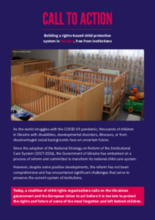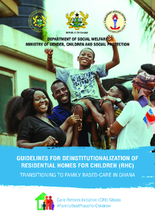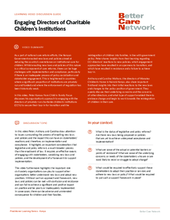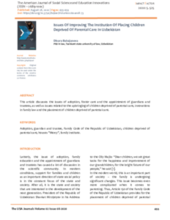Displaying 101 - 110 of 668
This call to action - issued by a coalition of child rights organisations including Hope and Homes for Children, Lumos, Eurochild, and SOS Children's Villages - calls on the Ukrainian government and the European Union to "act before it is too late to protect the rights and future of some of the most forgotten and left behind children."
By drawing on the experiences of parents, advocates, NGOs, and public officials, this side event invited discussion on how, through strengthening families and tools for prevention, societies can reduce the number of children being institutionalized. During the event, a panel of experts from the Republic of Moldova, South Africa, Burkina Faso, Vietnam, and the United States explored their experiences around efforts to empower parents and keep children with disabilities with their families.
The India Alternative Care Network (IACN) held a website launch event on 21 October 2020.
This document is aimed at complementing the Standard Operating Procedures (SOPs) for Licensing, Monitoring and Closure of Residential Homes for Children (RHC) by supporting the implementation of the closure of RHCs that have not been licensed or do not meet the standards in the SOPs.
Comprised of videos and accompanying discussion guides, this video series features the learning from practitioners working across a range of care-related programs and practices in Kenya.
In this video, Peter Kamau from Child in Family Focus discusses his organisation’s approach to engaging with the directors of privately-run charitable children’s institutions (CCI’s) to secure their buy-in for transition and the reintegration of children into families, in line with government policy.
This book provides new and empirically grounded research-based knowledge and insights into the current transformation of the Russian child welfare system. It focuses on the major shift in Russia’s child welfare policy: deinstitutionalisation of the system of children’s homes inherited from the Soviet era and an increase in fostering and adoption.
In this study on childcare staff in children’s homes of Kasaragod district of Kerala, the researcher adopted a descriptive design and selected all registered children’s homes for the study purpose.
This article offers a Local Process Initiative (LPI) process in the Devinuwara Divisional Secretariat Division (DSD) in the Matara District of Sri Lanka as an effective strategy for the deinstitutionalisation and quality alternative care of children in South Asia.
This article discusses the issues of adoption, foster care and the appointment of guardians and trustees, as well as issues related to the upbringing of children deprived of parental care, innovations in family law and the placement of children deprived of parental care in Uzbekistan.




